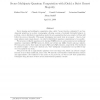Free Online Productivity Tools
i2Speak
i2Symbol
i2OCR
iTex2Img
iWeb2Print
iWeb2Shot
i2Type
iPdf2Split
iPdf2Merge
i2Bopomofo
i2Arabic
i2Style
i2Image
i2PDF
iLatex2Rtf
Sci2ools
117
click to vote
FOCS
2006
IEEE
2006
IEEE
Secure Multiparty Quantum Computation with (Only) a Strict Honest Majority
Secret sharing and multiparty computation (also called “secure function evaluation”) are fundamental primitives in modern cryptography, allowing a group of mutually distrustful players to perform correct, distributed computations under the sole assumption that some number of them will follow the protocol honestly. This paper investigates how much trust is necessary – that is, how many players must remain honest – in order for distributed quantum computations to be possible. We present a verifiable quantum secret sharing (VQSS) protocol, and a general secure multiparty quantum computation (MPQC) protocol, which can tolerate any ⌊n−1 2 ⌋ cheaters among n players. Previous protocols for these tasks tolerated ⌊n−1 4 ⌋ and ⌊n−1 6 ⌋ cheaters, respectively. The threshold we achieve is tight – even in the classical case, “fair” multiparty computation is not possible if any set of n/2 players can cheat. Our protocols rely on approximate quantum error-correcting...
Computation | FOCS 2006 | Multiparty Computation | Quantum Computation | Theoretical Computer Science |
Related Content
| Added | 11 Jun 2010 |
| Updated | 11 Jun 2010 |
| Type | Conference |
| Year | 2006 |
| Where | FOCS |
| Authors | Michael Ben-Or, Claude Crépeau, Daniel Gottesman, Avinatan Hassidim, Adam Smith |
Comments (0)

